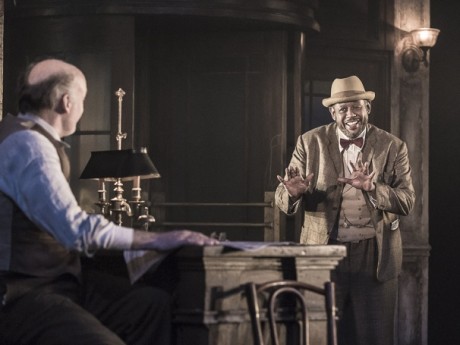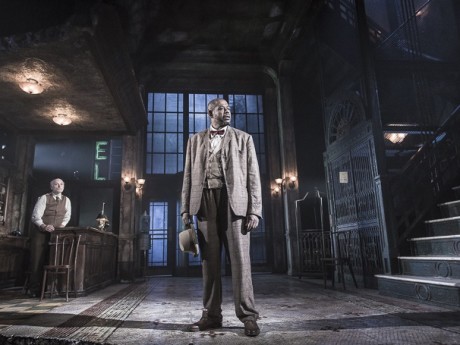Jason Robards first played the central character in this Eugene O’Neill one-act mood piece; that was in 1964. That character isn’t “Hughie” — no, he’s gone to his reward just before first curtain. But he remains a force, a presence, as “Erie Smith” stumbles into the ramshackle hotel where Hughie had long been the night clerk and the nourishment of Erie’s very needy sense of self worth. The new night clerk — a woebegone Irishman named Charlie Hughes — is now the lone soul to occupy the late night lobby of a broken down hotel in New York City, where Erie hangs his hat whenever he’s sober enough to find his way home after a night of gambling, carousing or drinking; sometimes all three in one long night’s journey into day. Erie is a most appealing loser drunk from whose every pore creeps a great sadness. He’s only 45, but he thinks and talks like a septuagenarian as he spends an hour before dawn dreaming, imagining, remembering and commenting in a monologue interrupted only now and then by a compassionate but slightly bored Charlie Hughes.

O’Neill has gifted Erie with his own night demons and as he shares them with Charlie and with us, we come to know and to empathize with him. He’s a sweet soul who’s made several wrong turns in life, and on this night he particularly misses the third ear of his pal Hughie, who somehow had always been able to restore his self-confidence, to join the sun in bringing shafts of light into the constant darkness of Erie’s days. There is the tiniest glimmer of hope that this poor drifter will at least get through another day as he finally grabs a shaky lifeline from Charlie Hughes.
Erie Smith, created by Jason Robards in 1964, returned to Broadway in 1975 via the work of Ben Gazzara and both actors received Tony nominations for their performances. Later, in 1996, film star Al Pacino tried the role, and now Forest Whitaker is having a go. He’s been given a first rate production, designed and costumed by Christopher Cram and lit by Neil Austin which greatly support the writing and the performance. One can feel the aching loneliness of this unnamed hotel, one can almost smell the damp and fading walls and we recoil at the scariness of the vast and winding staircase that leads to even more despair upstairs in the shadowy floors where people sleep. Adam Cork’s music and sound design enhance the mood and support Mr. Whitaker’s low keyed but intense delivery of Erie Smith.
Some of the columnists, tweeters, facebookers always seem to visit early previews of new works, and thrive on throwing out warnings to potential ticket buyers that they’d better beware. It gets particularly nasty when alarms are sounded about the star not being ready, not know his or her lines. We had rude comments on that score when Al Pacino recently began his run in David Mamet’s China Doll, it plagued Angela Lansbury in both Terence McNally’s Deuce and Noel Coward’s Blithe Spirit, and it arrived several times to batter Mr. Whitaker in this play. These non-participants, who thrive on destruction, are unaware or never knew that new works, or works new to the casts of revivals, automatically once spent 2-6 weeks on the road prior to opening in New York. Now they have a few previews, during which much of the repair time is spent on finishing the set, adjusting the lighting, sometimes replacing a miscast actor, often changing pages of script, and if these Cassandras had to learn a speech or two, let alone two or three pages, overnight-perhaps then they would be a little more compassionate about a prompt or two from the stage manager.
I happened to see all of above tryouts, and if its stars were being helped by wires in their heads, or stage managers hiding behind water coolers, I certainly never knew it. Now that Hughie has opened, Forest Whitaker is giving a magnificent performance in a role that requires 60 minutes of Mr. O’Neill’s beautiful words that slowly woo us into caring about Erie Smith.

Michael Grandage is a gifted director, on loan to us from the Donmar Warehouse in London, which he headed from 2002-2012, He has a basketful of awards for his work, and has been awarded honorary doctorates at two British universities. His work on creating atmosphere, tension, involvement on Hughie gives ample proof of why he’s been so rewarded.
I read today that this play will close in late March, not fulfilling its plan to play until mid-June. Those early arrows against it hurt the box office too much to give the play room to breathe.
I urge you to see Hughie before it closes — it’s not major O’Neill, but it is absorbing, filled with atmosphere, and I guarantee you that Erie Smith, as embodied by Forest Whitaker, will be a character you will long remember.
Running Time: 65 minutes, with no intermission.
Hughie plays through March 27, 2016 at The Booth Theatre – 222 West 45th Street, in New York City. For tickets, cal Telecharge at Telecharge
(212) 239-6200, or (800) 447-7400, go to the box office, or purchase them online.




